9 Best Compostable & Biodegradable Trash Bags To Greenify Garbage Day
Ready to talk trash?
By which we mean biodegradable trash bags!
Plastic trash bags are generally polyethylene bags, meaning they’re made with fossil fuels, take hundreds of years to decompose, and release harmful microplastics as they do.
While that white, black, or even vanilla-scented trash bag might make trash day a little less cringe-worthy, it’s also sending our planet to the landfill.
Fortunately, there’s been an explosion of biodegradable and compostable bags on the market recently.
But, just as all “trash” isn’t equal (read: compostables, recyclables, and online thrift store donations), we shouldn’t view all “eco-friendly” trash bags as equal either.
Albeit similar terms, compostable and biodegradable mean very different things.
We’ll (dumpster) dive into this later, but first, let’s bag up the best compostable trash bags to green your waste routine.
Everything we recommend to you on Sustainable Jungle is independently researched and we ask all brands to confirm their claims. To avoid waste, we test products on an as needed basis. This post contains affiliate links. If you buy something through our links, we may earn a small commission. Learn more about why we do this here.
The Best Biodegradable Trash Bags For Greener Garbage
BioBag helps us keep it clean with their compostable kitchen trash bags made from a GMO-free compostable resin.
Not exactly providing compostable trash bags, GreenPolly provides an alternative to virgin plastic bags with their non-biodegradable kitchen trash bags made from post-consumer recycled plastic and 10% bioplastic (read: better for landfills than compostable trash bags).
Canadian brand Second Nature Bags offers home compostable bags made from sugar cane, plant starches, and vegetable oils.
To find out how we sniffed through the trash and sorted out the compostable vs biodegradable trash bags debate to pull out the best compostable trash bags, dumpster dive to the bottom of the article (or watch our video below on how we tested a few of our top picks).
The Full List Of Biodegradable Garbage Bags
- BioBag | Visit Store
- GreenPolly | Visit Store
- UNNI | Visit Store
- Bag To Nature | Visit Store
- ProGreen | Visit Store
- Second Nature Bags | Visit Store
- Primode | Visit Store
- Give A Shit | Visit Store
- Green Earth | Visit Store
1. BioBag
About Biobag’s Compostable Trash Bags
On a mission to keep organic waste from entering landfill, BioBag is leading the way with its range of certified compostable garbage bags that are made in California.
Their bags come in several different sizes and all are certified “home compostable”, the gold (er, green) standard for compostable garbage bags.
In addition to their compostable kitchen trash bags, they offer compostable pet waste bags for your zero waste dog, compost bin bags, resealable bags, yard waste bags, snack bags, and more.
Their full list of certifications include: ISO9001, ISO14001, Non-GMO Project Verified, TÜV AUSTRIA (OK compost HOME, SOIL, and INDUSTRIAL ), Biodegradable Products Institute (compostable in industrial facilities—ASTM D6400), and AS 4736 (compostable in industrial facilities).
2. GreenPolly
About GreenPolly’s Biodegradable Kitchen Trash Bags
Compostable materials don’t break down properly in a landfill. Unless you have access to commercial composting facilities (or compost at home using home compostable certified bags), compostable garbage bags aren’t the answer.
So what do you use instead?
The same people who created BioBag developed GreenPolly, environmentally friendly trash bags free of virgin plastic.
They’re a greener choice than sending biodegradable, methane-releasing bags to landfills.
Their non-biodegradable garbage bags are 13 gallons in size and made from 90% certified post-consumer recycled plastic and 10% bioplastic from renewable sugarcane.
The durable, 3-ply bags feature a drawstring closure and come packaged in recycled cardboard.
3. UNNI
About UNNI’s Extra Large Compostable Trash Bags
UNNI wants to make the world a better place by using plant starch-based bags certified compostable by BPI (ASTM 6400) and TUV AUSTRIA (OK compost HOME).
They make compostable garbage bags in several different sizes from 2.6-gallon to 65-gallons.
Other products include pet waste bags, drawstring bags, bags with handles, and sandwich bags.
4. Bag To Nature
About Bag To Nature’s Compostable Trash Bags 3 Gallon
Bag To Nature has been in the biodegradable bag business since the late 1980s.
Their small compostable trash bags help you “eliminate the YUCK factor.”
Made of a blend of biodegradable polymers, they’re certified to the ASTM D6400 standard. In an active industrial compost environment, they’ll be reduced to carbon dioxide, water, and biomass in just a few weeks.
5. ProGreen
About ProGreen’s Small-To-Large Compostable Trash Bags
ProGreen’s compostable garbage bags (available from 3-gallon to 33-gallon) meet both ASTM D6400 and TUV AUSTRIA (OK compost HOME) standards.
The bags are strong and thick, and won’t tear or leak easily.
They come packaged in a cardboard box with 30 in each pack.
6. Second Nature Bags
About Second Nature’s Small Compostable Bags
Also meeting ASTM D6400 and TUV AUSTRIA (OK compost HOME) standards, the 100% certified compostable bags from Canadian company Second Nature Bags are suitable for backyard composting and will fully disintegrate in 28 weeks.
They’re made in the USA from bio-based, non-GMO materials including sugar cane, plant starches, and vegetable oils.
To avoid unnecessary dyes, they’re also clear.
Choose between 3-gallon, 7-gallon, and 13 gallon sizes.
7. Primode
About Primode’s Compostable Bags
Primode’s 100% compostable bags are made from plants and vegetables (mostly corn starch).
The bags are easy to use and meet ASTM D6400 and TUV AUSTRIA (OK compost HOME) standards.
They come in a large choice of sizes including an extra large 30-33 gallon compostable trash bag.
8. Give A Sh!t Compostable Dog Poop Bags
About Give A Sh!t’s Compostable Dog Waste Bags
Dog owners, you’ll know how many of those little pet-waste plastic bags you can get through.
Thankfully, Give A Sh!t specializes in eco-friendly pet products with their TÜV AUSTRIA-certified home compostable bags made from plant-based materials. These include cornstarch, PBAT (a biodegradable and compostable polymer), and glycerin.
The box and reel are made from 100% recycled cardboard.
10% of profits go to the Soi Dog Foundation to improve the lives of dogs and cats in Asia.
9. Green Earth
About Green Earth’s Biodegradable Trash Can Liners
Green Earth uses GMO-free crops to make their small compostable garbage bags, which meet ASTM D6400, TUV AUSTRIA (OK compost HOME and INDUSTRIAL), and European standard EN 13432.
These bags run on the smaller end, with 2.6, 3, and 13-gallon sizes available.
Green Earth donates 1% of its sales to charitable organizations promoting conservation and protecting our planet.
Did you know we Have a Newsletter?
We cover the latest in sustainable living, fashion, zero waste, beauty, travel, finance and more…
What Are Biodegradable Trash Bags?
Before we dive into biodegradable bags, here’s a quick refresher on what it means to be “biodegradable.”
According to Merriam-Webster, biodegradable is that which is “capable of being broken down, especially into innocuous products by the action of living things (such as microorganisms).”
Sounds innocent enough, right?
Until you realize that plastic being broken down into microplastics is not an eco friendly way to dispose of household waste, dog poop, or anything.
What are biodegradable trash bags made of?
Biodegradable trash bags typically fall into two material categories: biodegradable plastic bags and those made with bioplastic.
Biodegradable plastics are typically just petrochemical-based plastic designed so that exposure to certain things will help them break down faster.
What’s bioplastic?
Bioplastic, on the other hand, is usually made from plant-based and renewable materials, like corn, grains, sugarcane, starches, and vegetable oils.
One of the most common types of bioplastic is PLA (polylactic acid).
To make PLA, the sugars found in sugarcane, corn starch, or cassava are immersed in a hot water-sulfur dioxide solution so that the different components (fiber, protein, and starch) become “available”.
The starch is then separated out, some citric acids are mixed in and voila, we have PLA that can be used as an alternative to polyethylene, polystyrene, and polypropylene.
Another type of bioplastic is PHA or polyhydroxyalkanoate. It’s made from genetically-engineered microorganisms that consume organic materials to produce carbon reserves.
This microbe-made PHA has a plastic-like structure that can be harvested for trash bags as well as food packaging, medical products, and more.
Mater-Bi is another type of plant-starch bioplastic and true cellophane (as opposed to synthetic cellophane) is made from regenerated wood cellulose.
One benefit of all bioplastics is that they are free of toxins like bisphenol A (BPA). That, and they’re generally quicker to break down than conventional plastic trash bags.
How long does it take biodegradable trash bags to decompose?
However, their breakdown rate depends on what these bags are made of and where they end up.
You might see words like “photodegradable” or “oxo-degradable”, which means plastic bags that break down in sunlight or air, respectively (read: living organisms aren’t involved).
But when they enter the environment (where living organisms are present), biodegradable plastic bags are just as bad as regular plastic trash bags (despite their much higher price tag)!
Are biodegradable garbage bags compostable?
Compostable and biodegradable bags are one in the same, right?
Some biodegradable bags are compostable, but not all. It depends on what they’re made of.
For composting, we need to look for bags that are specifically made (and certified) for this purpose.
Are biodegradable trash bags recyclable?
While trash bags are recyclable, unfortunately, biodegradable plastic can’t be recycled like other types of plastic. Worse, they can contaminate otherwise perfectly sorted recyclables.
What Are Compostable Trash Bags?
Compostable trash bags are the next-level trash bags.
Before we discuss why compostable bags have the capacity to be the best biodegradable garbage bags, let’s refresh what “compostable” actually means (or take a deep dive into some lesser known composting facts, if you like).
According to Cambridge Dictionary, compostable is “something that can be used as compost when it decays.”
Like biodegradable, compostable materials can fully break down into natural elements, but they can also become something that’s beneficial for the soil (AKA humus…and not the kind you spread on crackers).
How long does it take compostable trash bags to decompose?
For something to be legally biodegradable, it must break down in a “reasonably short” period of time—which leaves a LOT of room for interpretation and subsequent greenwashing.
Compostable products, on the other hand, must break down in 12-24 weeks.
How do compostable trash bags work?
Compostable garbage bags have to meet certain criteria to be deemed “compostable.”
Most often, this means meeting the three basic provisions of the ASTM D6400 standard:
- The product must experience physical disintegration, to the point that it is not “readily distinguishable” from the finished compost product.
- Actual biodegradation must take place, meaning that microorganisms consume the product at a rate similar to other, well-known compostable materials.
- The products left at the end of the composting process must not harm or diminish plant growth.
Essentially, a compostable material must “reach or exceed 90% conversion of the carbon within the material into carbon dioxide (CO2)” during a specific time frame (usually 180 days).
This means that just 10% will return to the soil as compost and the majority will enter our atmosphere as greenhouse gas emissions.
BUT (and it’s a big but), all this is based on perfect compostability, using a high-heat industrial composting facility—not an indoor compost bin that can’t reach high temperatures.
This brings us to perhaps the most important aspect of compostability: proper disposal.
How to dispose of compostable trash bags?
By now you might be asking: are compostable trash bags better than biodegradable trash bags?
Yes, but if and only if they are properly disposed of.
Using compostable garbage bags doesn’t give you free rein to dispose of them however you please.
Your green compostable trash bag isn’t so “green” when you consider that, if sent to a landfill, the anaerobic (AKA oxygen-absent) conditions will lead to a release of methane—a greenhouse gas with 100-year warming potential 28x higher than carbon dioxide.
It’s incredibly important to properly actually compost a compostable trash bag so that it can break down aerobically via naturally occurring microorganisms.
Otherwise, it’s arguably worse than a plastic bag.
Put another way, a compostable bag needs five things: microbes, moisture, oxygen, heat, and time.
Without these, they could end up either not decomposing, or releasing harmful greenhouse gasses into the environment—which is why a dedicated waste stream is necessary.
Fortunately, more industrial composting facilities are popping up around the globe, along with dedicated food and yard waste bins for curbside pickup.
If you don’t live in an area with curbside composting, you can use the Find A Composter website (US only) to find out where to send your bagged food scraps. Many composting facilities are classified according to accepted feedstocks which vary by state, so be sure to look for those that accept mixed solid waste (usually Class I).
Alternatively, the best compostable trash bags can be composted in a backyard compost bin!
Or look up local farmers and community gardens who might gladly take on your neatly-bagged compostables.
However, because a home compost environment is very different from municipal and industrial facilities, you can only safely do this if they are certified home compostable.
Currently, the only certifications for this are TUV Austria’s OK compost HOME certification and ABA’s Home Compostable Verification logo. There aren’t any home compost standards in the United States.
What are acceptable compostable trash bags?
There are a few things to look for when it comes to compostable garbage bags that are actually compostable.
Check for certifications/logos from the following:
- The Biodegradable Products Institute (BPI): Their Compostable Logo indicates that the product meets either ASTM D6400 (includes bags) and/or ASTM D6868 (for packaging).
- TUV AUSTRIA: They provide three different certifications, OK compost HOME S0014 (okay for home composting systems); SOIL S0014 (biodegradable); and OK compost INDUSTRIAL S0014 (okay for industrial composting systems).
- European Bioplastics Standard: This standard, EN 13432 is used for compostable materials that disintegrate after 12 weeks and fully biodegrade after six months. Look out for their Seedling Logo.
- Australasian Bioplastics Association’s (ABA): The AS 5810 Home Compostable Logo is one of the few standards indicating home compostability. AS 4736 is also commonly used, meaning suitable for commercial composting facilities.
Compostable Vs Biodegradable Trash Bags
So, which is better: biodegradable or compostable trash bags?
If you’re wondering where to buy biodegradable trash bags, we’ll provide you with a better option: go for compostable instead.
Even the best biodegradable bags don’t stand up to properly-disposed-of compostable options.
According to a recent study, degradable bags and biodegradable bags were still able to carry a load of groceries AFTER THREE YEARS IN THE SOIL.
Compostable bags, on the other hand, were still intact but couldn’t carry weight. However, within three months, they did completely break down in a marine environment.
Compostable bags on the whole may be better, but different brands vary a lot.
If you’re wondering where to buy compostable trash bags, we recommend sticking to the ones we’ve listed.
Final Thoughts On Compostable & Biodegradable Trash Bags
Who would have thought taking out the trash could get so complicated?
The marketing around biodegradable bags, much like recycled garbage bags, means that most people *think* they’re saving the planet—when actually they’re inadvertently contributing to microplastic pollution.
If that makes you want to ditch trash bags altogether, we don’t blame you!
So, for apartment composting, ditching the compost bags and collecting your food scraps and other compostable items in a reusable container is the best option.
You could also repurpose a paper grocery bag instead of using biodegradable small trash bags.
Crafting a DIY newspaper bin liner or trying out reusable trash bags that are popping up as a zero waste solution are other greener garbage days ideas.
If you really want a bag (or you’re sending your waste to a commercial composting program), opt for one of the compostable garbage bags on our list. Just be sure you properly compost them, instead of sending them to a landfill with your regular trash.
Share this article with eco-minded peers and help clear up confusing marketing and misleading labels. Together, we (trash) can make a difference.
Pin these:
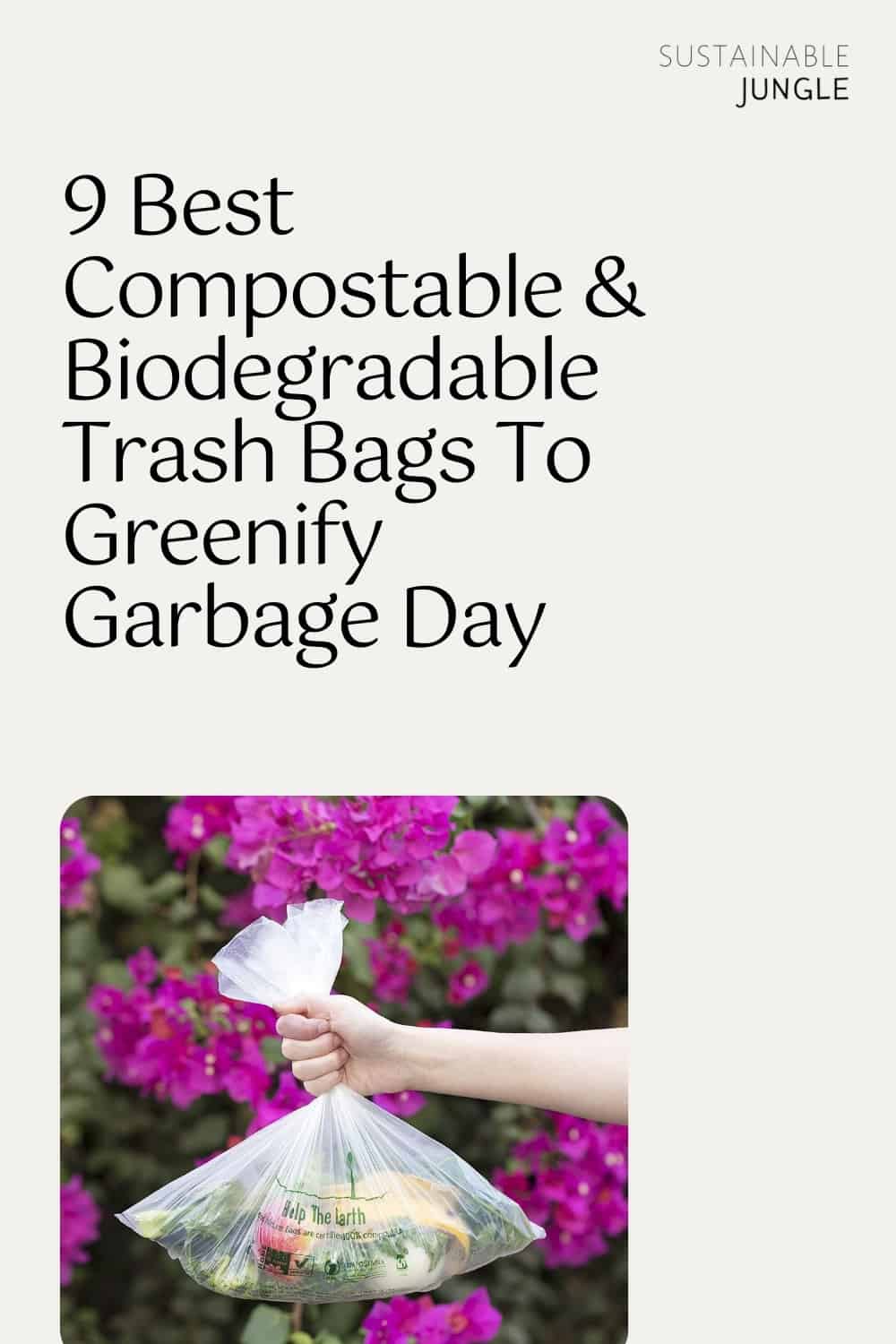
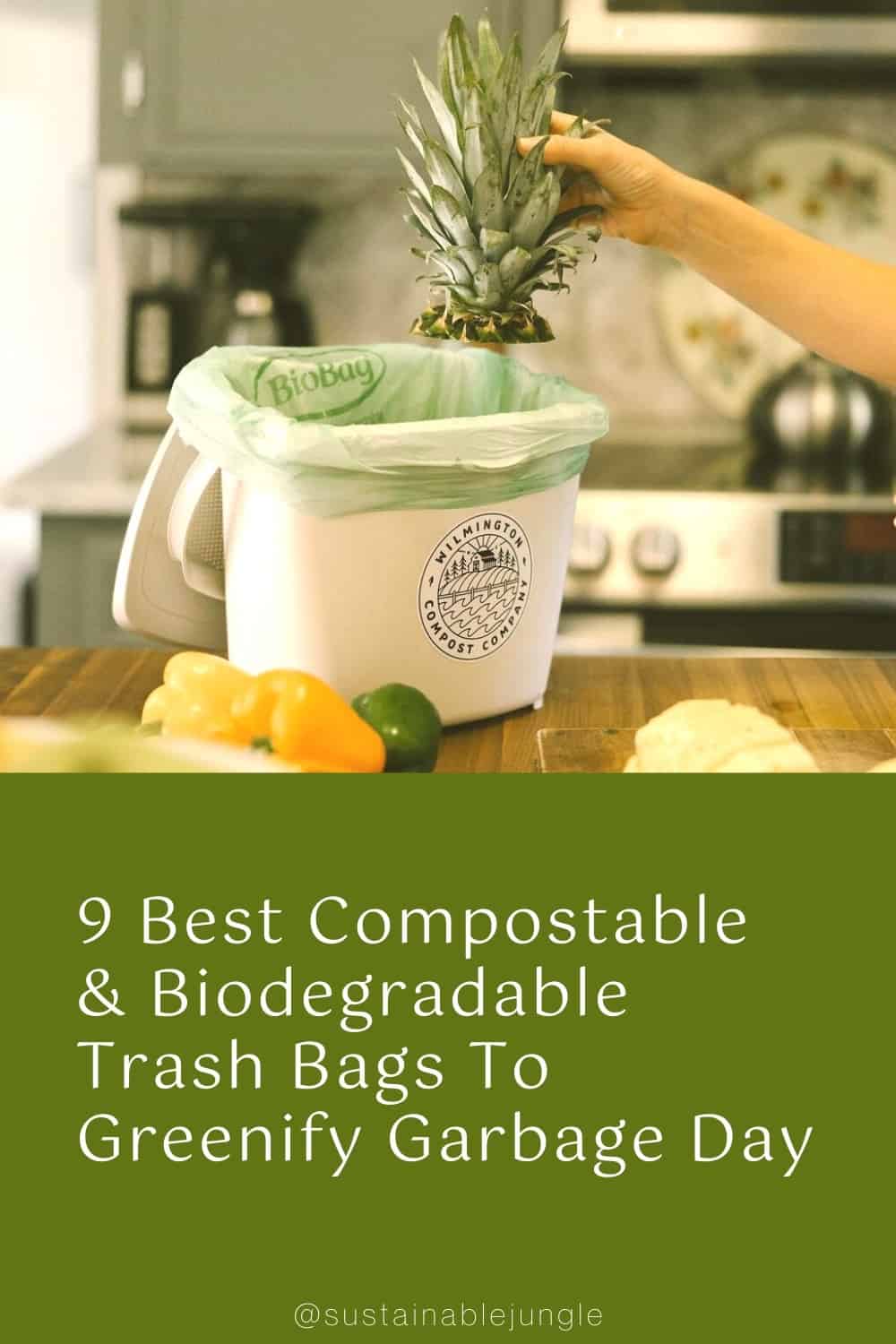

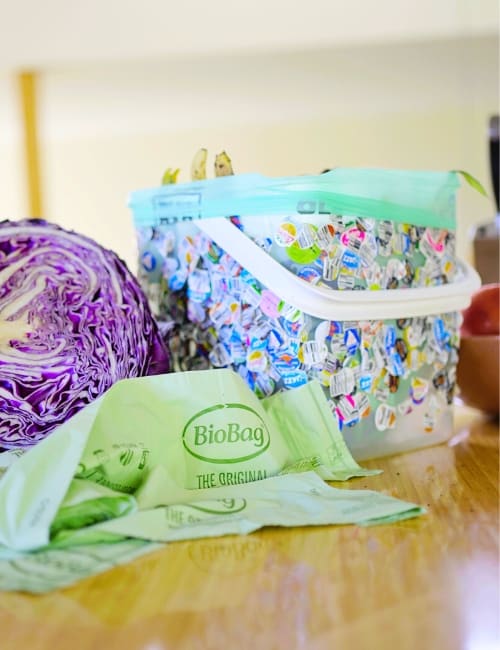
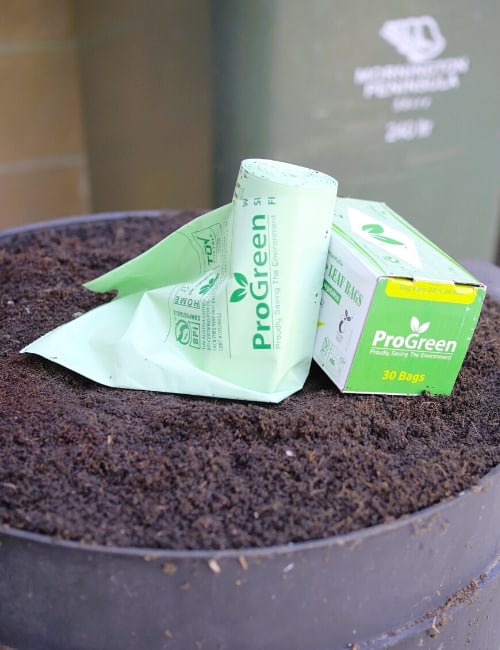
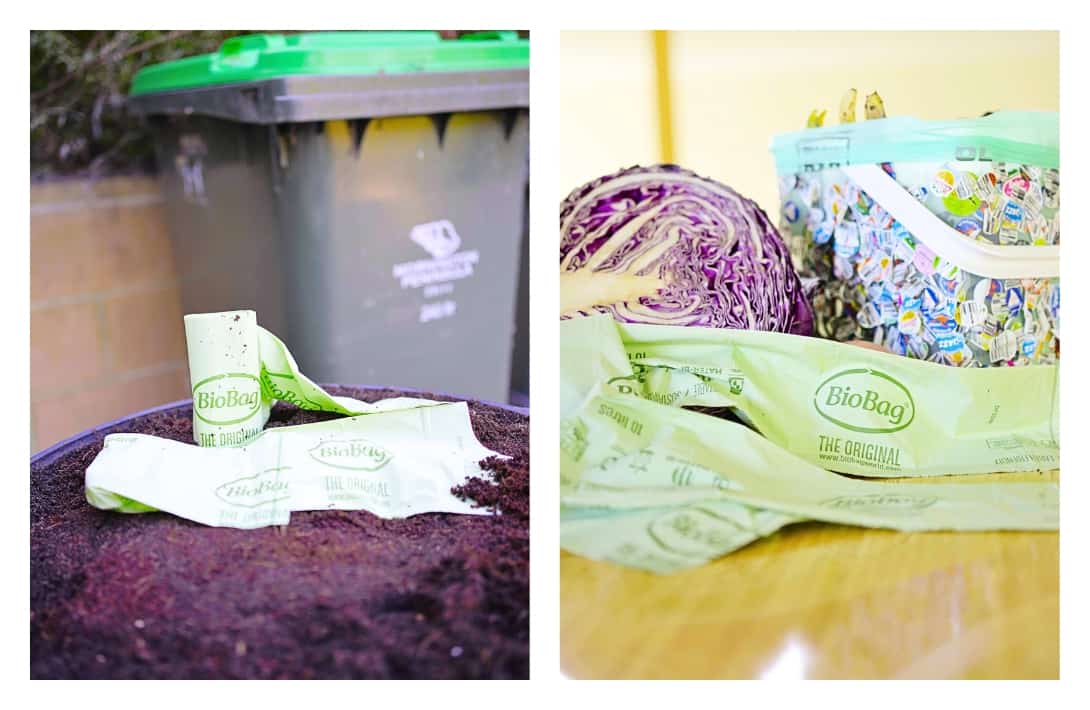
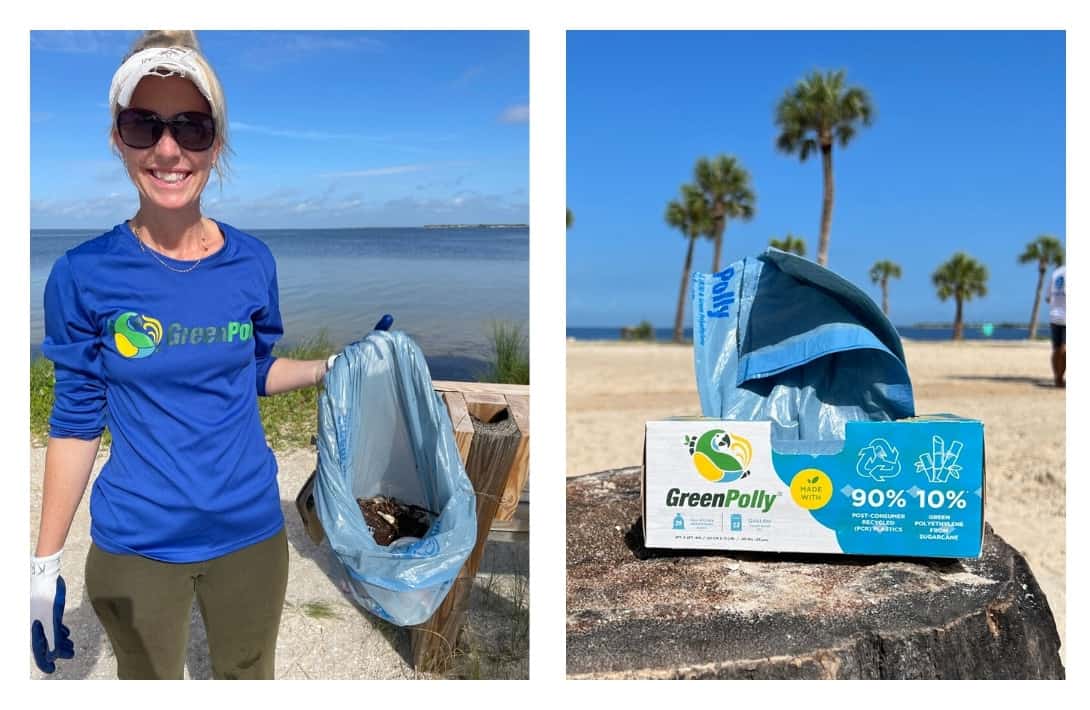
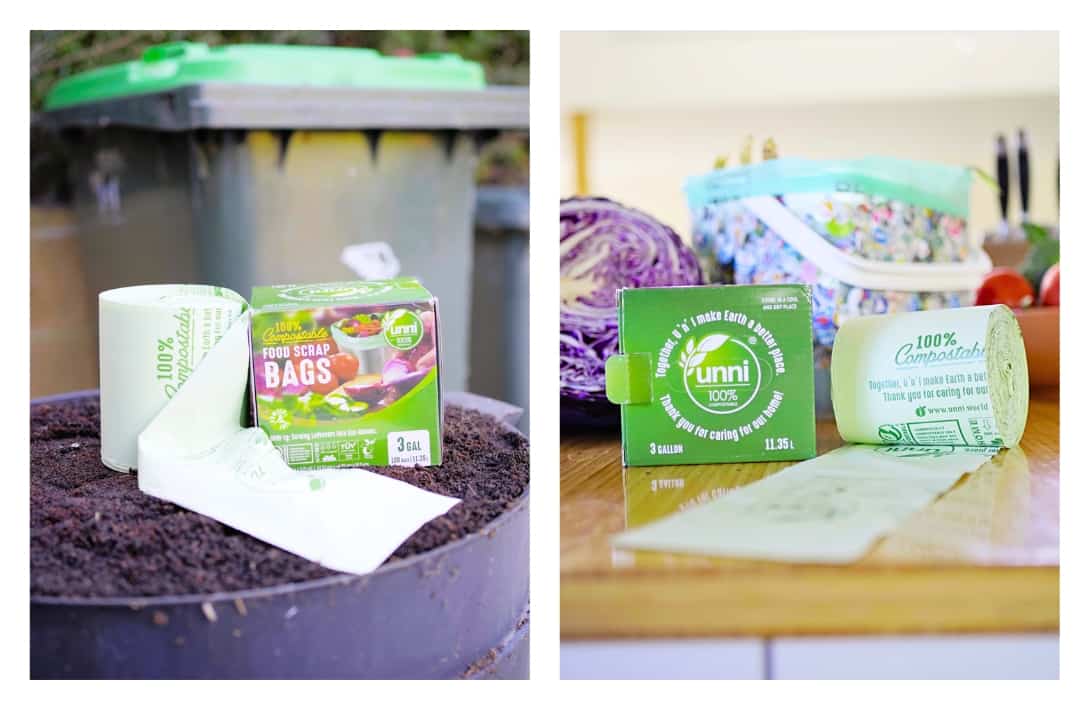
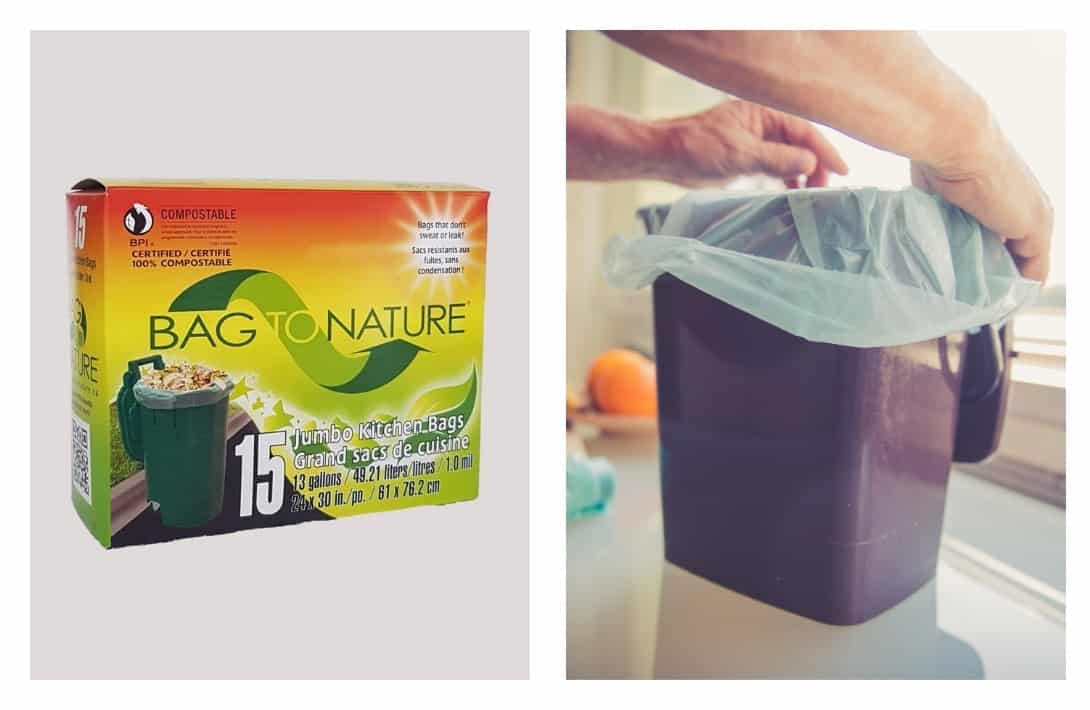
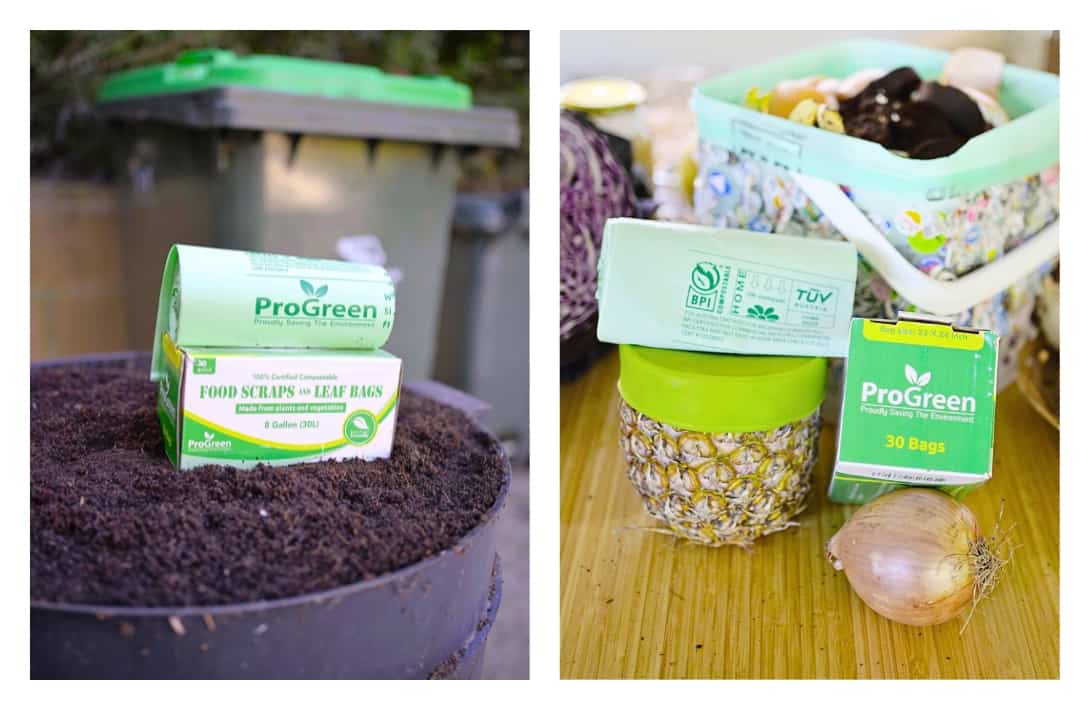
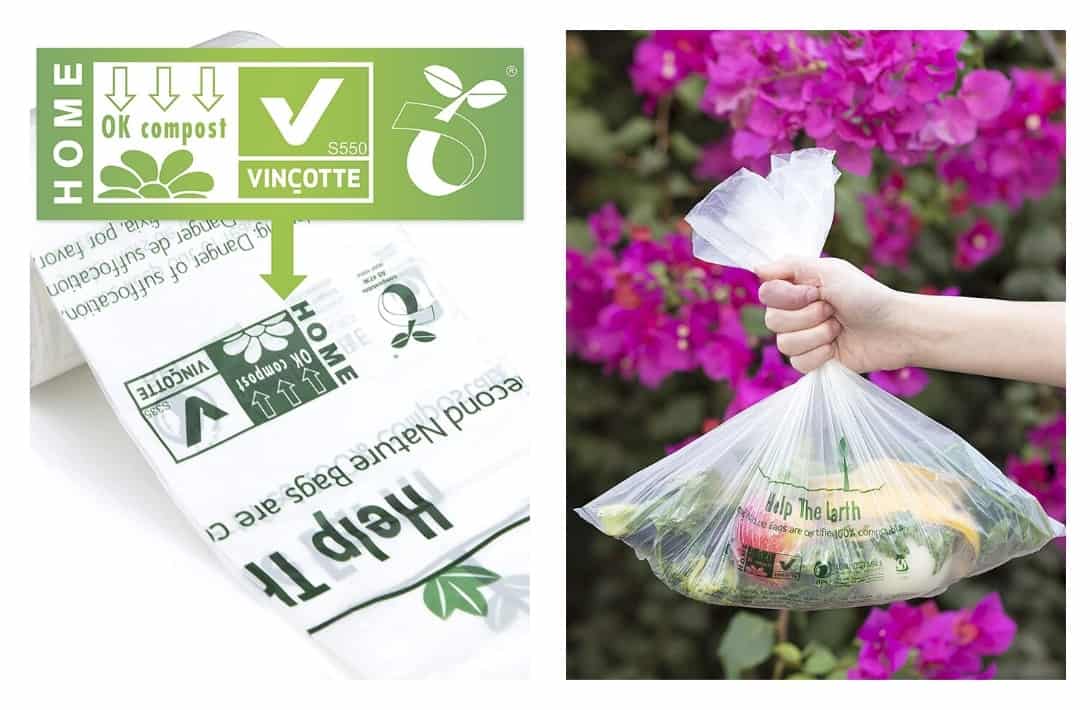
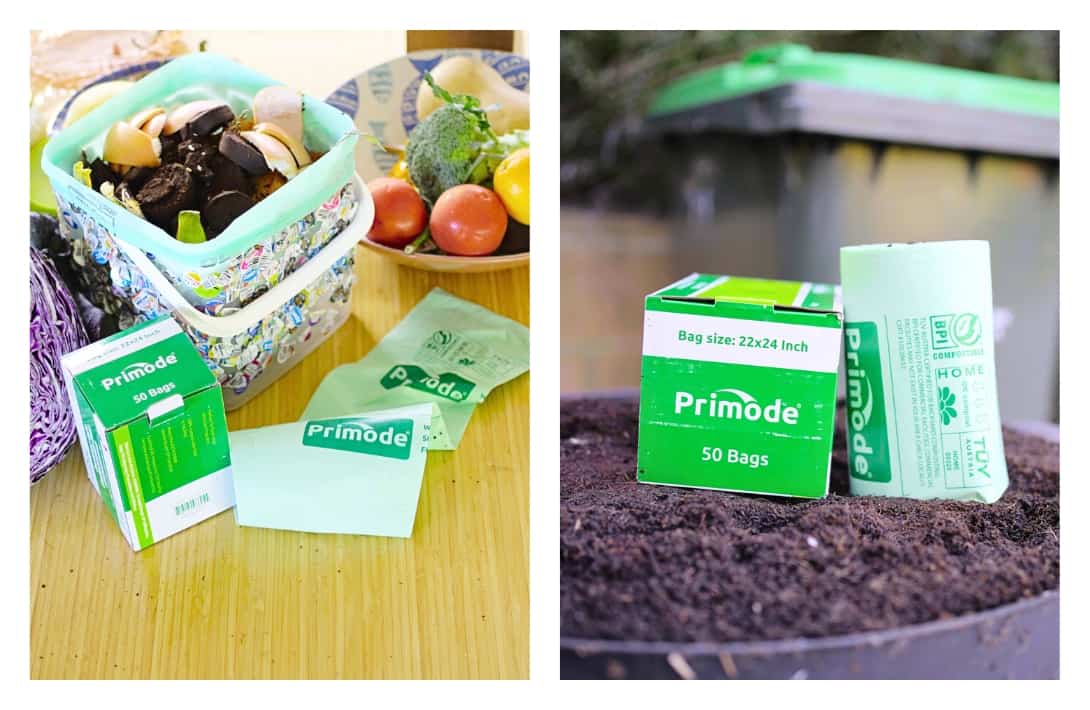
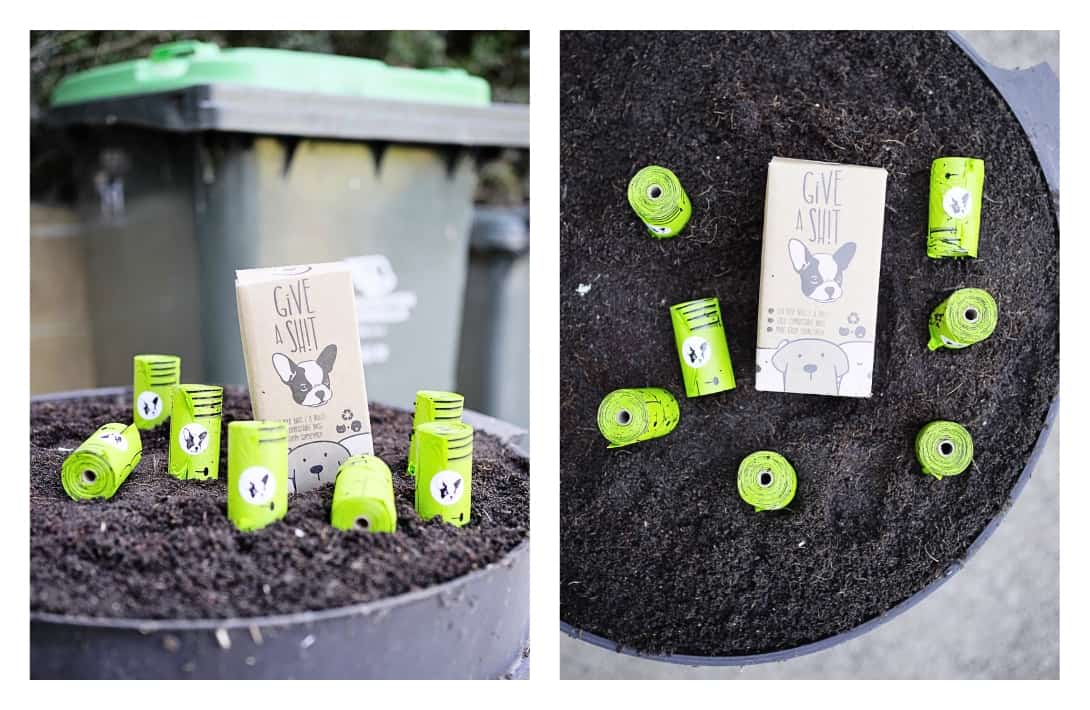
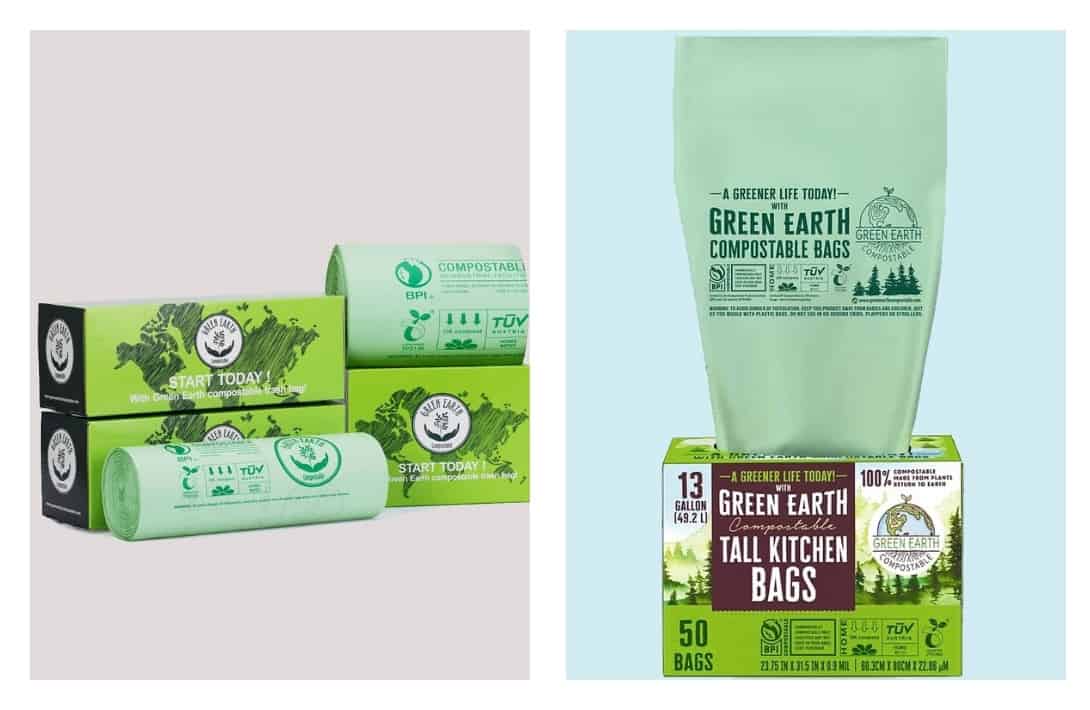

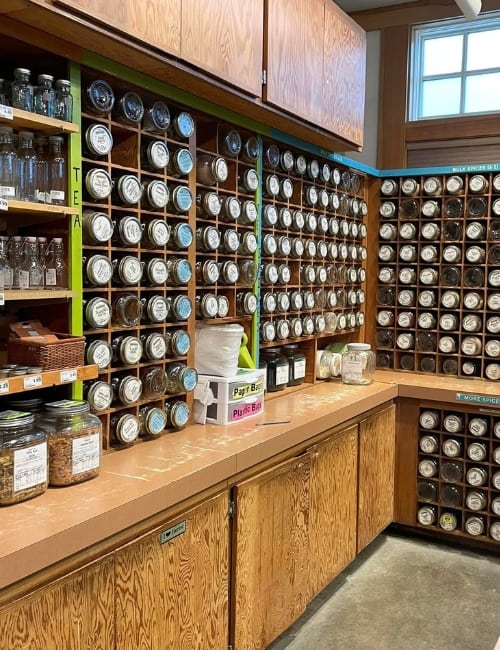
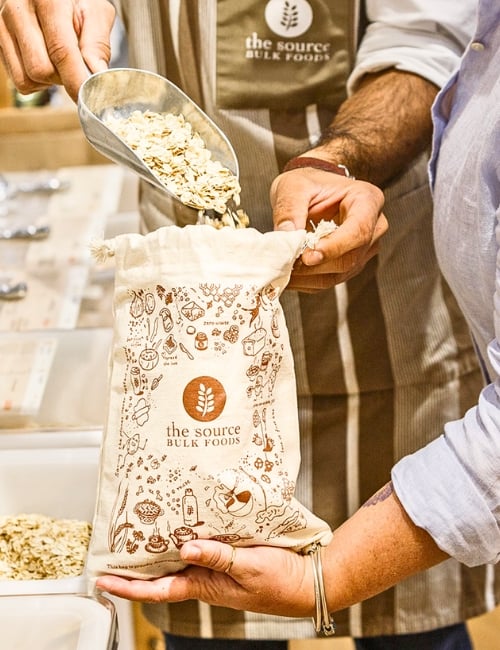
So I have used compostable doggie bags for a few years now but using compostable garbage bags never crossed my mind for some reason! I will definitely have to add these to my list next time instead of the plastic!
-Life After Life Foundation
For trash that goes into the landfill (very little but yes there is some), it is not clear to me which trash bag to use. Let us say we are not comfortable with putting the trash directly in the bin that the city picks up from. You have said that compostable bag can be worse than plastic bag if it goes into the landfill. Hence it looks like, for that limited use, for trash that goes in the black garbage bin, it is better to use a plastic trash bag. Do let me know what you think.
Hi Jayanthi, yes I agree it’s super confusing and so hard to know what the right thing to do is. Given the release of methane from compostable bags, personally at the time of writing this, I think it’s best to use recycled plastic bags for trash headed to landfill. Best to re-use bags you have received along the way but otherwise check to see if your grocery store has any that are made from recycled plastic (I found some made from recycled ocean waste for example). We’ve had several people ask this question so we will look at doing a proper deep dive on this question!
So biodegradable trash bags won’t work in the landfill? And either will compost bags?
I have created a Pay it Forward page where we reuse/repurpose everything from bags and boxes to home goods & food. You name it, if it’s legal, it’s on there.
I use biodegradable poop bags for my dogs. But I wanted my trash bags to breakdown too.
I reuse whatever I can. I buy sensibly, I use my own reusable netted bags for produce and my own bags for groceries & I recycle.
I use less than 1 trash bag a week now.
Hi Kass, sounds like you are making a big effort to limit your impact on the environment, thank you! Agree it’s so very confusing when it comes to trash bags that need to go to landfill given compostable bags create methane in landfill and biodegradeable bags can break down into microplastics – hard to know what’s worse… then you add in plant based bags, recycled ocean bags and it gets even more confusing! We’re going to write a deep dive article on this more specific topic that compares the pros and cons of all of these options so watch this space!
You’ve really left me totally confused as to what to do. There is NO compost station within 200 miles of my home so compostable bags that I purchase & use will end up in the landfill which you say is a worse alternative. I can’t compost them myself nor do I want to reuse & wash out trash bags (although I reuse plastic bags for as long as I can.) So, it appears that I’m left with using regular plastic bags or paper bags which may not hold up to my kitchen waste if it is moist.
Hi Nancy, agreed, it’s super confusing and thank you for caring enough to comment. Sadly, it does seem like that’s the consensus for now (re not using compostable bags outside of a compost environment). The other thing to look at for landfill bound bags is to use recycled plastic bags instead (so at least they have had a previous life)! I know – it’s so hard to do the right thing sometimes! Presume you’re already doing all you can to reduce your waste in the first place so you already probably have a low impact so thank you again for doing what you can!
Benefits of using trash bags .
Reduce the amount of oil utilized in the development of virgin plastics.
Lower CO2 emissions associated with the production of virgin plastics.
Help prevent trash bags made from virgin resins from ending up on landfills.
Great share!!